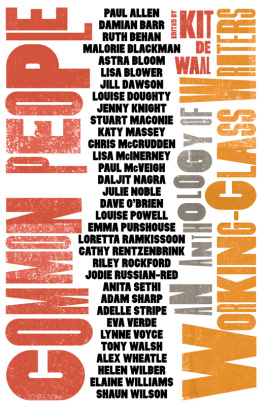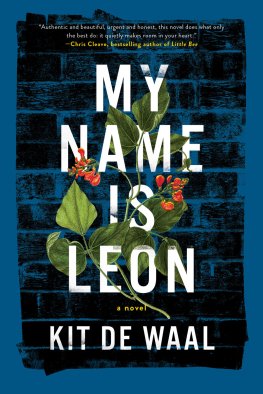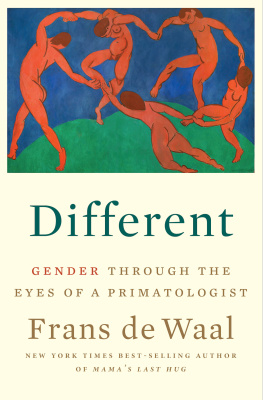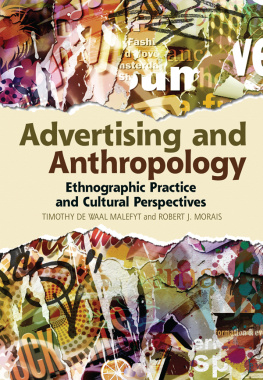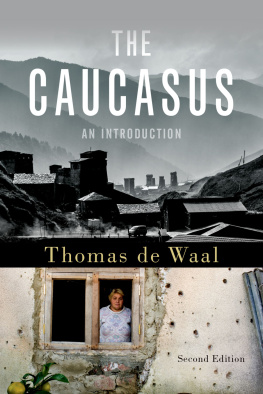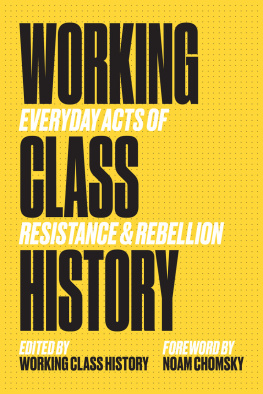Kit De Waal - Common People: An Anthology of Working-class Writers
Here you can read online Kit De Waal - Common People: An Anthology of Working-class Writers full text of the book (entire story) in english for free. Download pdf and epub, get meaning, cover and reviews about this ebook. year: 2019, genre: Art. Description of the work, (preface) as well as reviews are available. Best literature library LitArk.com created for fans of good reading and offers a wide selection of genres:
Romance novel
Science fiction
Adventure
Detective
Science
History
Home and family
Prose
Art
Politics
Computer
Non-fiction
Religion
Business
Children
Humor
Choose a favorite category and find really read worthwhile books. Enjoy immersion in the world of imagination, feel the emotions of the characters or learn something new for yourself, make an fascinating discovery.
- Book:Common People: An Anthology of Working-class Writers
- Author:
- Genre:
- Year:2019
- Rating:5 / 5
- Favourites:Add to favourites
- Your mark:
- 100
- 1
- 2
- 3
- 4
- 5
Common People: An Anthology of Working-class Writers: summary, description and annotation
We offer to read an annotation, description, summary or preface (depends on what the author of the book "Common People: An Anthology of Working-class Writers" wrote himself). If you haven't found the necessary information about the book — write in the comments, we will try to find it.
Common People: An Anthology of Working-class Writers — read online for free the complete book (whole text) full work
Below is the text of the book, divided by pages. System saving the place of the last page read, allows you to conveniently read the book "Common People: An Anthology of Working-class Writers" online for free, without having to search again every time where you left off. Put a bookmark, and you can go to the page where you finished reading at any time.
Font size:
Interval:
Bookmark:

For everyone who finds their lives written in these stories
With special thanks to Paula Hawkins for generously supporting this book
Tony Walsh (aka Longfella)
Lisa McInerney
Katy Massey
Chris McCrudden
Jodie Russian-Red
Stuart Maconie
Loretta Ramkissoon
Emma Purshouse
Cathy Rentzenbrink
Louise Powell
Helen Wilber
Jill Dawson
Riley Rockford
Daljit Nagra
Paul Allen
Louise Doughty
Eva Verde
Damian Barr
Adam Sharp
Lisa Blower
A Brief History of Industrial Action,
Vauxhall Motors, Ellesmere Port
Lynne Voyce
Kit de Waal
Elaine Williams
Adelle Stripe
Jenny Knight
Anita Sethi
Ruth Behan
Paul McVeigh
Shaun Wilson
Alex Wheatle
Astra Bloom
Malorie Blackman
Julie Noble
Dave OBrien
I started this foreword a dozen times. I thought Id start off with something witty and literary to show that common people can quote the classics and should be taken seriously.
Then I decided, no. Be yourself. So I began a riff about what its like to be working class. How, when all the world wants the same thing a long life with enough to eat and a sound roof, a good education, meaningful, paid employment on safe streets and a reason to laugh from time to time working-class people have to pick a few things off the list and do without the others. Bleak, I thought. Too bleak.
Context is where I went next. Facts and figures. Dazzle them with data. I was going to spend 500 words on how many of us there are, how much we live on or cant live on, by what horrendous percentage living standards have declined and poverty has increased, and the precarious nature of working-class life today. I would demonstrate, with a graph or preferably a Venn diagram, the grim intersection of class, race, disability and gender. But theres already an academic in this book who does that better than I can, so I thought Id better leave the numbers to the expert.
I wanted to throw in an amusing anecdote about the editors and agents who took me aside at book launches and whispered, Im working class too, you know, and I heard in their confession a pride and nostalgia for the lives they had left behind or had to hide. I also heard relief that, at last, someone on these pages might tell their story and say its OK to be working class, you can step out of the closet (or broom cupboard). But Im not a comedian and the anecdotes werent that funny.
In the end, fittingly, this foreword is an opportunity to thank everyone who has supported this book, this cause, this telling of untold stories. To all the writer-development agencies (New Writing North, Literature Works, Spread the Word, Writing East Midlands, Writing West Midlands and the National Centre for Writing in Norwich): thank you for the massively difficult task of sifting through so many submissions and providing us with the seventeen excellent memoirs by brilliant new writers whose lives demonstrate such resilience, humour, solidarity and courage. To all the published writers who leapt on board at the first opportunity, lending their names and their stories to this book of common people: thank you for your generosity and faith in this project and for standing alongside us.
And to you, you who have pledged good money and time, who have tweeted and liked and cheered from the sidelines, thank you from all of us, sincerely.
Most of all, these memoirs, written in celebration and not apology, are dedicated to everyone who has yearned to see their life on the page, who has hoped one day to read about working-class lives told by the working-class people who lived them. Todays the day. Enjoy.
Kit de Waal
Tony Walsh (aka Longfella)
They dont like it when we make it despite all their ifs and cuts
They dont like it when we take it as our right to shake things up
They dont like it when rough voices start demanding better choices
But its tough, weve had enough and we are coming
They dont like it when our stories rise above the kitchen sink
They dont like it when we learn, remember, organise or think
They dont like it when weve knowledge so they price us out of college
But its tough, weve had enough and we are coming
They dont like it when were standing on our own, on our own terms
They dont like it when our candle lights another so it burns
They dont like it when were spotted in a slot theyve not allotted
But its tough, weve had enough and we are coming
They dont like it when were uppity and throw a ladder down
They dont like it when weve sussed it and we grow and gather round
They dont like it when we minions have articulate opinions
But its tough, weve had enough and we are coming
They dont like it when our pens begin to join up all the dots
They dont like it when we send back what weve learned to the have-nots
They dont like it when our writers can ignite us into fighters
But its tough, weve had enough and we are coming
They dont like it when the common people sing a single song
They dont like it when forgotten people realise were strong
They dont like when race and gender join with class as one agenda
But its tough, weve had enough and we are coming
They dont like it when our classes are not cowered but empowered
They dont like it when the masses clock the power that is ours
They dont like it when their victims will not suck their fucking dictums
But its tough, weve had enough and we are coming
Millions strong!
Yes, its tough, weve had enough.
And we are coming.
Lisa McInerney
Of the various social classes, working class is the most slippery. If, like me, you were born into a working-class family or community, do not be concerned about being labelled in perpetuity. The world is lousy with people who will happily erase your identity, and you dont even have to pay them.
This is a big statement to make; after all, is it not that social class exists in all of its impermeability for a reason? If social class was an unsettled state, then surely it wouldnt be social class at all; it would be called current circumstances and wed all be flinging it on and off like modish headwear. But, alarmed by alarmist reports that membership numbers are shrinking, the middle classes seem to have taken the drastic measure of attempting to induct as many wretches as possible. And, wearing otherness as though its a suit of armour, the working classes seem to have adopted adoption as a viable method of dealing with the successful. Whatever about median income and the evolution of Marxist theory, if youve got a pair of chinos or a third-level education, prepare for assimilation.
I write about working-class characters. I do so not because I want to redress the balance in English-language literature, where characters seem to be comfortably middle class by default, but because its my default.
No car, no holidays, no opinion on Joyce; a council house, a cynics caution, an army of cousins.
I have highfalutin ideas about storytellers responsibility; there are certain stories that are yours to tell (This task was appointed to you, Frodo of the Squalor, and if you do not find a way, no one will). Still, it surprises me when I am asked questions about my supposedly noble motives, or referenced as a writer who writes about lives that are not often featured front and centre in literature. It shouldnt surprise me, because were all very worried about the homogenisation of literary fiction, but it does, because if Im working class why wouldnt I write about working-class lives? Its not as if Im doing it as court-ordered community service.
Next pageFont size:
Interval:
Bookmark:
Similar books «Common People: An Anthology of Working-class Writers»
Look at similar books to Common People: An Anthology of Working-class Writers. We have selected literature similar in name and meaning in the hope of providing readers with more options to find new, interesting, not yet read works.
Discussion, reviews of the book Common People: An Anthology of Working-class Writers and just readers' own opinions. Leave your comments, write what you think about the work, its meaning or the main characters. Specify what exactly you liked and what you didn't like, and why you think so.

